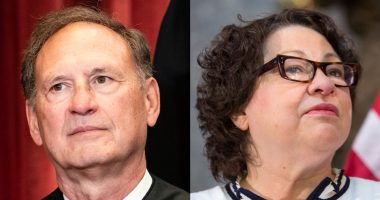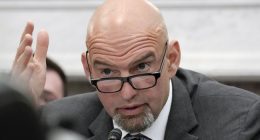
President Joe Biden’s son Hunter Biden leaves after a court appearance, Wednesday, July 26, 2023, in Wilmington, Del. (AP Photo/Julio Cortez, File)
A dispute about Hunter Biden’s “extravagant lifestyle” has resurfaced as the focus of various recent motions in his federal gun case.
A flurry of documents was filed with the U.S. District Court for the District of Delaware this week over the presidential son’s firearms-related legal woes by both the defense and the prosecution.
The defendant and special counsel David Weiss are currently battling over what, exactly, the state will be allowed to present during trial.
In one such filing, the title itself makes the heart of the defense’s pretrial complaint plain to see: “Mr. Biden’s Motion In Limine To Exclude Any Reference To His Alleged ‘Extravagant Lifestyle.’”
“Mr. Biden moves to exclude any argument, reference, or questioning at trial regarding his alleged spending on an ‘extravagant lifestyle’ during periods that Mr. Biden was suffering from addiction,” the 4-page motion argues.
During a phone call earlier this month, the government alluded to using witnesses who “may have interacted with Mr. Biden during those periods, which could open the door to this topic,” according to the defense filing.
“Mr. Biden disagrees,” the filing goes on. “Any reference to this issue, including using the characterization in the Special Counsel’s California indictment (e.g., spending on ‘an extravagant lifestyle’) would not be relevant to the issues or charges in the Delaware gun case.”
The defendant says any references to alleged extravagance on his part would be more prejudicial than probative and ultimately serve the purpose of misleading the jury about key issues.
In fact, the defense says it does not want the government to talk about money or freewheeling at all during the trial.
“Here, any evidence or testimony about alleged extravagant spending or lifestyle is not relevant to issues in this case,” the motion to exclude continues. “Moreover, whatever testimony is needed from fact witnesses could occur with directions not to include such references or characterizations. Nor does the Special Counsel need to delve into the subject of how much money was spent or whether an event was extravagant.”
The filing concludes with an example of what defense lawyers are asking the judge overseeing the case to keep away from jurors:
For example, a witness who testifies to meeting Mr. Biden at a hotel room or having dinner with him, should not be asked such questions as whether the hotel room or meal was extravagant, or how much the hotel room or meal cost.
In response, the government filed a similarly transparently titled motion of their own: “Response To Defendant’s Motion In Limine To Exclude Any Reference To His Extravagant Lifestyle.”
Working backward from the concluding example cited by the defendant, the government agrees, disagrees, and clarifies what it intends to argue during the fast-approaching Delaware trial.
“The government does not intend to ask a witness who met Mr. Biden in a hotel room how much the hotel room cost,” the response dryly notes. “While the government disagrees with the notion that the words ‘extravagant lifestyle’ are prejudicial, the government agrees that example is not relevant in this case.”
The government says “the focus of its case in chief will not be whether the defendant was living an extravagant lifestyle,” but “will include some evidence that the defendant was spending money.”
Helpfully, the somewhat-mocking-in-tone response catalogues what the prosecution believes might be relevant spending:
[T]he defendant spent large sums of cash on drugs and drug paraphernalia; the defendant was staying at hotels while traveling with a witness who observed his drug use; the defendant withdrew sums of cash from ATMs in locations that are consistent with his described whereabouts in his book, including in Delaware around the time of the gun purchase; the defendant withdrew cash prior to his purchase of the firearm at issue in this case; the defendant tendered $900 in cash when he bought the gun; and the defendant was living a life as he described it in excerpts of the book identified in the government’s motion to admit.
According to Weiss, those expenditures are likely to find their way to jurors’ eyes and ears for the purposes of trying to prove key evidence and, therefore, key parts of the government’s case – including whether the defendant “was a user of controlled substances or an addict, and whether he purchased the gun.”
“Again, while the government does not concede that the phrase ‘extravagant lifestyle’ is prejudicial, the government writes to advise that relevant evidence of certain of the defendant’s spending will be introduced during trial,” the state’s motion concludes.
President Joe Biden’s adult son has taken to complaining about the prosecution’s use of his checkered past – including the defendant’s own past admissions in the form of his memoir – as of late.
On Monday, the younger Biden complained that Weiss was attempting to use only selective portions of his memoir against him – and asked again for permission to include other parts of the book that go to his state of mind and might be considered “extremely relevant.”
The 46th president’s son has waged an aggressive criminal defense strategy as he fights special counsel David Weiss’ gun prosecution in Delaware, where Biden was indicted in September 2023 after an agreement to plead guilty to misdemeanor tax crimes fell apart.
In the three-count indictment, prosecutors allege the defendant failed to disclose – on paperwork filed with the Bureau of Alcohol, Tobacco, Firearms and Explosives – he was using drugs when he purchased a gun in Wilmington in 2018. Biden is also charged with lying to a licensed gun dealer and for possessing a firearm while using narcotics.
The trial is currently slated to begin on June 3.
Have a tip we should know? [email protected]









